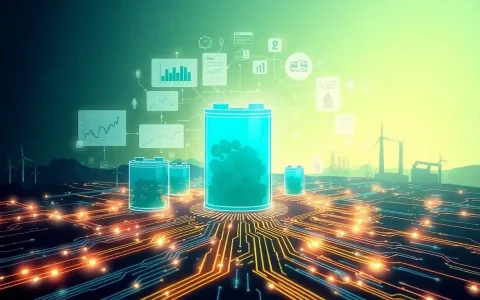
The transition of Nigeria’s energy sector is intricately linked to the effective deployment of energy storage technologies which can play a pivotal role in enhancing energy reliability, facilitating renewable integration, and ultimately transforming the energy landscape. This article will elucidate several aspects: 1. Energy storage enhances reliability by stabilizing power supply, 2. Integration of renewable energy sources is facilitated by energy storage, 3. Economic benefits arise from optimized energy use, and 4. Environmental impacts can be mitigated through effective storage solutions. Notably, the complexities surrounding energy storage also involve technological, financial, and regulatory dynamics that must be addressed to maximize its potential.
1. THE IMPORTANCE OF ENERGY STORAGE IN NIGERIA
Energy storage is a crucial component of modern power systems, especially for a nation grappling with frequent power outages and an unreliable energy supply. In Nigeria, where the demand for electricity consistently outstrips supply, advancements in battery technology and other storage mechanisms have emerged as critical factors in stabilizing the grid. Energy storage systems can store excess electricity generated during off-peak hours and release it during peak demand periods. This capability not only addresses the inconsistency of power availability but also enhances the overall resilience of the energy infrastructure.
Moreover, energy storage technologies, including lithium-ion batteries, pumped hydro storage, and flywheels, represent a transition toward a more sustainable energy future. Each storage technology has its unique advantages, suited to different geographic and economic contexts in Nigeria. The implementation of these solutions allows for a reduction in reliance on fossil fuels and promotes the utilization of renewable energy sources, such as solar and wind. Furthermore, energy storage can serve as a buffer against fluctuations in energy prices, making electricity more affordable for all consumers.
2. INTEGRATING RENEWABLE ENERGY SOURCES
The integration of renewable energy sources into Nigeria’s energy mix presents both significant opportunities and challenges. As the country seeks to harness its abundant solar and wind resources, one of the major barriers to this integration is the intermittent nature of these energy sources. Energy storage plays an indispensable role in overcoming these intermittencies by storing energy generated during sunny or windy periods and dispatching it when production drops. This process results in a continuous flow of electricity, thereby alleviating the stress placed on the existing energy grid.
Furthermore, grid stability is enhanced with the use of energy storage systems. By deploying distributed energy resources (DERs) alongside battery storage, Nigeria’s electric grid can become more responsive and adaptable to changing conditions. This adaptability is essential for a smoother transition toward a renewable-centric energy system. Additionally, storage solutions contribute to a lower carbon footprint by allowing for a higher penetration of renewables, thereby decreasing reliance on fossil-fuel-based power plants that often generate electricity at peak times.
3. ECONOMIC BENEFITS OF ENERGY STORAGE
Investing in energy storage technologies holds considerable economic advantages for Nigeria. These technologies not only help in mitigating the impact of frequent energy shortages but also lower costs associated with energy generation. Businesses and industries reliant on stable power supply can benefit from reduced operational costs and enhanced productivity, ultimately leading to the creation of more jobs and economic prosperity.
Energy storage can also enable time-of-use pricing, allowing consumers to capitalize on lower electricity rates by utilizing stored energy during peak demand hours. This dynamic can lead to a more equitable distribution of energy costs among consumers, making electricity more affordable, particularly for lower-income households. Moreover, the development of local energy storage projects can stimulate economic opportunities in manufacturing, installation, and maintenance sectors, contributing to job creation and skill development in the energy sector.
4. ENVIRONMENTAL IMPACTS AND CONSIDERATIONS
As Nigeria navigates its energy transition, the environmental implications of energy storage cannot be overlooked. Utilizing energy storage technologies contributes to a substantial reduction in greenhouse gas emissions and improves air quality across the nation. By promoting the uptake of renewables and reducing dependency on traditional fossil fuel sources, Nigeria can significantly combat climate change and its associated effects.
Additionally, integrating energy storage solutions can help ensure a sustainable cycle of energy consumption. However, the production and disposal of batteries and related materials pose environmental concerns that need to be addressed through responsible recycling and production practices. Government regulations and incentives for clean energy technologies can facilitate the responsible deployment of storage systems while mitigating any potential ecological impact.
5. REGULATORY AND POLICY FRAMEWORK
A robust regulatory and policy framework is essential for promoting energy storage in Nigeria. Policymakers must lay the groundwork for incentivizing investments in energy storage technologies through subsidies, tax breaks, and supportive tariffs that benefit storage systems. Tailored regulations that encourage the adoption of renewables and facilitate grid interconnections will help create a feasible environment for energy storage development.
Moreover, it is vital to establish standards and protocols for energy storage systems to ensure they’re safe, efficient, and reliable. Collaboration among stakeholders, including government bodies, utilities, and commercial entities, is crucial in developing concerted strategies that drive the growth of energy storage. Investments in research and development must also be prioritized to ensure that Nigeria remains at the forefront of technological advancements related to energy storage.
6. PUBLIC PERCEPTION AND AWARENESS
Despite the clear advantages of energy storage solutions, there remains a gap in public understanding and awareness of these technologies in Nigeria. To achieve successful implementation, educating the populace about the benefits of energy storage is critical. Awareness campaigns and community engagement initiatives can help demystify these systems and foster a sense of ownership and collaboration in the energy transition.
Additionally, partnerships between government bodies and private organizations can facilitate knowledge-sharing and capacity-building efforts. By communicating how energy storage can enhance energy reliability and sustainability, public perception can shift toward embracing modern energy solutions. Active participation from communities can play a vital role in the successful deployment and operation of energy storage systems across Nigeria.
7. CHALLENGES TO IMPLEMENTATION
While the potential benefits of energy storage are significant, there are inherent challenges to its implementation in Nigeria. One primary obstacle includes the upfront capital cost associated with energy storage technologies. Many individuals and organizations may struggle to afford the initial investment required for setting up and maintaining storage systems, thus necessitating innovative financing solutions.
Additionally, the lack of skilled workforce in the energy storage sector presents a challenge to widespread deployment. Investment in education and training programs is essential to create a pool of professionals equipped to design, install, and maintain energy storage systems. Furthermore, technological advancements must also adapt to local contexts, ensuring that solutions are effective in Nigerian conditions and can thrive under local market dynamics.
FAQS
WHAT TYPES OF ENERGY STORAGE TECHNOLOGIES ARE AVAILABLE?
Numerous energy storage technologies exist, and their suitability varies based on specific applications and regional requirements. The most commonly employed methods include lithium-ion batteries, which have gained prominence in both residential and commercial applications due to their efficiency and declining costs. Pumped hydro storage is another prevalent option, utilizing gravity and flowing water to store energy, particularly suitable for locations with significant elevation differences. Flywheel energy storage systems offer fast response times and reliable performance, ideal for ancillary services in managing grid stability. Each technology has its characteristics, making it important to assess local conditions and energy demands before selecting a suitable solution. As Nigeria moves toward optimizing its energy system, these varied storage technologies will play integral roles in achieving energy reliability and flexibility.
HOW CAN ENERGY STORAGE ENABLE RENEWABLE INTEGRATION?
Energy storage technologies are vital in addressing the inherent fluctuations associated with renewable energy sources such as solar and wind. Their ability to store excess energy generated during peak production times allows for energy to be dispatched precisely when consumers need it most, instead of relying solely on immediate generation capabilities. This capability ensures that renewables contribute effectively to the overall energy mix and reduces reliance on traditional fossil fuel sources. By integrating effectively with the grid, these technologies not only enhance system reliability but also bolster Nigeria’s commitment to reducing greenhouse gas emissions. Furthermore, energy storage helps stabilize prices by mitigating supply-demand gaps, leading to a more cost-effective electricity market that encourages broader adoption of renewable sources.
WHAT POLICIES ARE NEEDED TO SUPPORT ENERGY STORAGE DEVELOPMENT?
To cultivate a conducive environment for energy storage deployment, comprehensive and supportive policies must be put in place. These can include financial incentives like tax credits, subsidies, or low-interest loans aimed at reducing the initial capital burden associated with installing energy storage systems. Regulations that facilitate interconnection with existing grids and streamline permitting processes will support faster project deployment. Furthermore, creating clear standards for energy storage system performance and safety will instill confidence in consumers and investors alike. Collaborative efforts between government bodies, industry stakeholders, and academia are crucial to formulating these policies and promoting research and innovation in energy storage technologies. Collectively, these measures can pave the way for a more dynamic energy landscape in Nigeria, ensuring the successful integration of energy storage.
In summary, the trajectory of Nigeria’s energy transition is inextricably linked to the strategic implementation of energy storage technologies. By addressing the pressing challenges and harnessing the benefits associated with energy storage, Nigeria can significantly enhance its energy security, integrate renewable resources, and foster economic growth. The multifaceted advantages of energy storage extend beyond mere technical enhancements; they possess the potential to revitalize entire communities, creating jobs and promoting sustainable development. As the nation seeks to establish a modern, resilient energy infrastructure, comprehensive policy frameworks and public awareness initiatives will be fundamental to drive widespread adoption. Through a collaborative approach involving government, businesses, and local communities, Nigeria can lead the region in effecting change within its energy sector. Consequently, energy storage will not only support Nigeria’s energy transition but will also contribute to a greener, more prosperous future for all stakeholders involved.
Original article by NenPower, If reposted, please credit the source: https://nenpower.com/blog/the-potential-of-energy-storage-in-supporting-nigerias-energy-transition/











